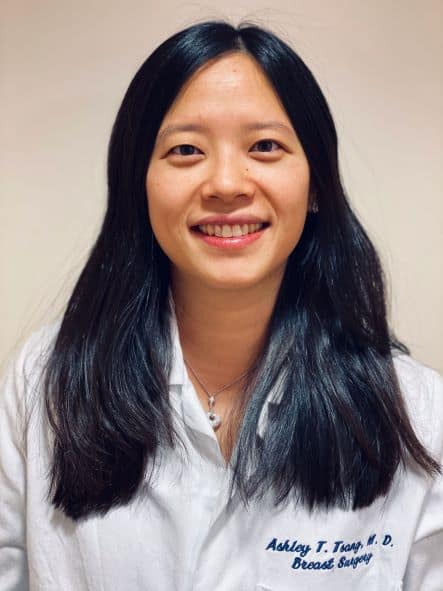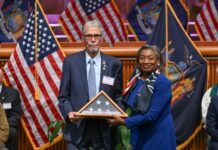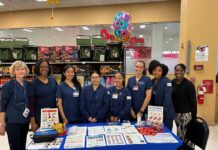
By Dan Murphy
The announcement by U.S. Senator and former Presidential candidate Amy Klobuchar in September that she had been diagnosed and treated for breast cancer in 2021, is a case that should be shared with women about how early detection and screening can lead to successful treatment, according to Dr. Ashley Tsang, Mount Sinai Doctors-Westchester.
On Sept. 9th Senator Klobuchar, 61, wrote, “In February of this year, doctors found small white spots called calcifications during a routine mammogram. After this was discovered, I had a biopsy and then learned that I had Stage 1A breast cancer.
“After a number of other tests, I returned to Mayo and had a lumpectomy on the right breast which involved the removal of the cancer. In May, I completed a course of radiation treatment, and after additional follow-up visits, it was determined in August that the treatment went well. At this point my doctors believe that my chances of developing cancer again are no greater than the average person,” said Klobuchar.
Dr. Tsang said that Klobuchar’s successful early diagnosis and treatment of breast cancer should be used as an example and wake up call for women about the importance of how patients can use screenings to maintain their own health, especially during Breast Cancer Awareness month in October 2021.
“We know that one in eight women get breast cancer, and that figure has not changed in decades, despite the advancements in health care and medical research, “said Dr. Tsang. “The fact that Sen. Klobuchar had a mammogram in February, and they detected something which a biopsy confirmed was Stage 1A Breast Cancer, shows that for those patients who are found to have something abnormal on a screening mammogram and if it is caught early, like Klobuchar, it can save their life.”
“The two most common presentations of breast cancer are a palpable breast mass, or an abnormal screening mammogram. The latter presentation is often early stage, and the earlier breast cancer is diagnosed, treatments like chemotherapy may not be necessary,” said Dr. Tsang.
Sen. Klobuchar continued, “I also want to call attention to the fact that many people have been delaying physicals and routine examinations because of the pandemic. I know that because I delayed mine. Studies have found that thousands of people who missed their mammogram due to the pandemic may be living with undetected breast cancer.
“It’s easy to put off health screenings, just like I did. But I hope my experience is a reminder for every one of the values of routine health checkups, exams, and follow-through. I am so fortunate to have caught the cancer at an early enough stage and to not need chemotherapy or other extensive treatments. “
Dr. Tsang said, “Those who are at average risk should begin screening mammograms at age 40, according to the American College of Obstetricians and Gynecologists and the American College of Radiology. It is important to know if you are high risk for developing breast cancer, because a screening maybe required earlier, and it may also include an MRI of the breast.
“Women who are considered high risk are those with a family history of breast or ovarian cancer, those who carry a genetic mutation associated with increased risk, and patients who have had a prior breast biopsy which showed high risk lesions such as atypical ductal hyperplasia, atypical lobular hyperplasia, and lobular carcinoma in situ. “
“High risk screening would include an annual MRI of the breast and an annual mammogram alternating every six months. Women who have dense breasts may also have increased risk for breast cancer as it is often difficult to evaluate for small masses within the dense breast tissue.
NYS law requires women are notified if they have dense breast tissue, and those women should consider supplemental ultrasound along with their screening mammogram every year,” said Dr. Tsang.
Senator Klobuchar and Dr. Tsang also agree on the fact that some patients have put off their medical testing and screenings because of COVID, but now is the time to catch up.
“Some women have been diagnosed at a later stage because the pandemic has delayed their annual screenings. It’s important not to forget to continue your testing and screening routine at this time. Now is the time to catch up and get tested,” said Dr. Tsang.
Florida First Lady Casey DeSantis also shared her breast cancer diagnosis during Breast Cancer Awareness Month in the hopes that it will inspire more women to get tested.
Ashley T. Tsang, MD is a board certified, fellowship-trained breast surgeon from Stanford School of Medicine, specializing in the treatment of benign and malignant diseases of the breast and management of patients at high risk for breast cancer. Dr. Tsang is Assistant Professor of Surgery at Icahn School of Medicine at Mount Sinai, a Diplomate of the American Board of Surgery, and a member of the Society of Surgical Oncology and the American Society of Breast Surgeons.
Dr. Tsang has offices at Mount Sinai Doctors-Westchester in Scarsdale, 341 Central Park Avenue, (914)-370-5000. Visit https://www.mountsinai.org/locations/westchester for more information.





